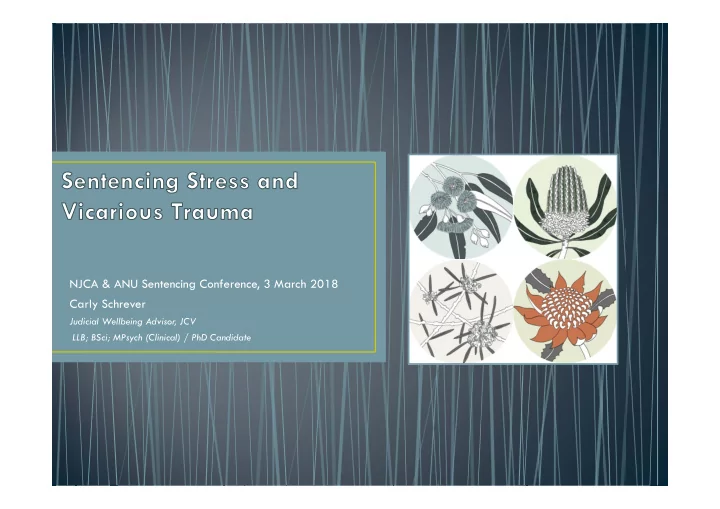

NJCA & ANU Sentencing Conference, 3 March 2018 Carly Schrever Judicial Wellbeing Advisor , JCV LLB; BSci; MPsych (Clinical) / PhD Candidate
Stressors of Work Stressors of Work Stressors of Work Load: Type: Culture: • • • Increasingly high case Conflict & Isolation • load disagreement Scrutiny • • • More documents and Highly emotional & Public • more laws tense No feedback • • • Insufficient time for Managing mental No management • writing judgments illness or personality Stress denying • • Extra duties of office problems of court Expression of emotion • Limited opportunity to users and opinion • delegate Traumatic material constrained • • Making decisions that Safety concerns • significantly impact No career progression • people’s lives Longevity of service (Bremer, 2004; Frierson; Kirby, 1997; Miller & Richardson, 2006, O ’ Brien 2004; etc…)
• Psychological distress (Kelk et al., 2009) • Burnout (Lustig et al. 2009) • Vicarious Trauma (Vcklevski & Franklin, 2008) • Secondary Traumatic Stress (Chamberlain et al, 2009) • Emotional Labour (Roach Anleu & Mack, 2005) • Transitional Stress (Travis, 2007) • Decision-making fatigue (Danziger et al., 2011) • Compassion fatigue (Burke, 2014) • Low Job Satisfaction (Chase & Hora, 2009) • Depressive symptoms (Chan et al., 2014) • Anxious symptoms (Chan et al., 2014)
Secondary Trauma Reactions Burnout Vicarious Trauma Secondary Compassion Traumatic Stress Fatigue Disruptions to a persons’ Development of PTSD Reduction in the Presence of emotional beliefs about safety, symptoms capacity or interest in exhaustion, cynicism, and power , independence, (re-experiencing, being empathetic feelings of disconnection esteem, intimacy, arousal, avoidance, towards others, from others, resulting and/or frame of emotional numbness) believed to result from from prolonged work reference as a result of following the traumatic ongoing expenditure and interpersonal being exposed to experience of an of empathy demands another’ s traumatic important person experiences
• Cumulative impact of traumatic material • Often triggered by a detail of personal relevance or significance • Disruptions to beliefs about the world… and the justice system McGuire & Byrne (2017), The law is not as blind as it seems, Psychiatry, Psychology and Law
Nature of Stressor Intrinsic Extrinsic i.e. inherent to the role, i.e. potentially unnecessary to irreducible sources of stress in the performance of judicial judicial office, unavoidable function, avoidable Intervention approach Management Prevention • • Individual level Individual level • • Interpersonal level Interpersonal level • • Organisational level Organisational level
1. Prioritise general wellbeing 2. Personal rituals to support role definition
MOVING TOWARD FROM WORKING WITH SURVIVORS MOVING AWAY FROM WORKING WITH SURVIVORS Preoccupation with ‘Crusader’ approach Wanting to know efficiency more Doing it all oneself Observing faculty Cynicism Empathy Trying to fix Professional Minimising contact everything Responsibility for detachment one’s behaviour and No responsibility for people’s reactions Excessive the reaction of Maintaining responsibility for others boundaries Insufficient allowance people’s feelings for problems Developing Variety of Excessive strategies professional Blaming survivors accommodation of activities people’s difficulties Advocacy for Displacement onto intervention other issues OVERINVOLVEMENT IDEAL RANGE UNDERINVOLVEMENT
1. Prioritise general wellbeing 2. Personal rituals to support role definition 3. Limiting exposure to traumatic material – to the extent possible a. Reducing the evocativeness of the material b. Limiting the number of like cases heard in a row 4. Professional help – don’t leave it too late!
Nature of Stressor Intrinsic Extrinsic i.e. inherent to the role, i.e. potentially unnecessary to irreducible sources of stress in the performance of judicial judicial office, unavoidable function, avoidable Intervention approach Management Prevention • • Individual level Individual level • • Interpersonal level Interpersonal level • • Organisational level Organisational level
Recommend
More recommend